|
 Become
a fan on Facebook
Become
a fan on Facebook  Follow
on Twitter Follow
on Twitter
Article by Mark Dujsik | December 27,
2013
Here
are the ten best films of 2013:
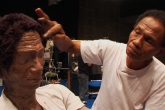 10.
The Act of Killing 10.
The Act of Killing
Attempting
to understand why people perpetrate the kind of atrocities—mass killings of
between 500,000 and two million communists, union workers, Chinese nationals,
and anyone else the government considered to be "enemies"—that
happened in Indonesia between 1965 and 1966 is problematic. The mere act of trying to understand implies there is a reason, and in
reason—no matter how erroneous and inhuman it may—there is a justification,
whether one believes the rationale behind it or not. In The Act of Killing, director
Joshua Oppenheimer (The film was also co-directed by Christine Cynn and at least
one anonymous person) sidesteps the hurdle by only pretending to care why these
monsters, who are treated as celebrities in a country where the government that
ordered the killings is still in power and still spreading the same kind of fear
that led to them, did what they did. Oppenheimer lies, telling them they'll be making a movie about their
deeds, and the most disturbing part of this horrifying documentary is that the
subjects—including Anwar Congo, who despicably tries to garner sympathy for
himself—are so proud of what they've done that they probably don't need the
push.
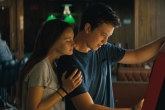 9.
The Spectacular Now 9.
The Spectacular Now
The
story of a fun guy who finds love in his polar opposite, The
Spectacular Now gets a lot of mileage from the possibility that Sutter
(Miles Teller) might not actually have found love with Aimee (Shailene Woodley)
and from the fact that, if he has, he's probably doing more harm to her than
good. Sutter, a senior in high school, is a functioning alcoholic. His girlfriend has dumped him, and he's convinced he'd rather skip
college and work. Aimee is a bookworm who desperately wants to go to college but has to
work because her mother won't. The tension here is that Sutter's relationship with Aimee, a genuinely
decent person with a lot of potential, might just be a way for him to feel
better about himself. He has plenty of reason to want that. His father (Kyle Chandler, in a short but impactful performance)
abandoned the family when Sutter was a kid, and there's a lot of uncomfortable
but necessary honesty in Scott Neustadter and Michael H. Webber screenplay
(based on Tim Tharp's novel). Director James Ponsoldt's sage character study is about the darker forces
in the lives of seemingly ordinary teenagers and the cyclical nature of
emotional injury.
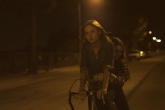 8.
Short Term 12 8.
Short Term 12
Short
Term 12, the feature-film debut of writer/director Destin Daniel Cretton,
comes from his personal experience working at a residential facility for at-risk
teenagers. In between the central story of one of those workers trying to face her
own history of abuse, there is a real sense of the daily operation of its
eponymous locale. There's a real air of authenticity to the details—both big (the
interactions of staff with each and with residents) and small (how no one on the
staff reprimands the new guy for making a mistake because one of the teens makes
his error known in no uncertain terms). The place is akin to limbo for teenagers with no sense of a
"normal" life; they will stay there until family situations change or
they turn 18, whether they're ready to make it on their own or not. The film focuses on Grace (Brie Larson, reaching into the depths of
suffering and retrieving a compassionate performance), who needs help herself
but would rather use her anguish as a way to connect to others who need help. The stakes here are high but never
manipulative. Remarkably, even in the face of so much trauma, the film remains hopeful.
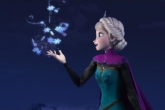 7.
Frozen 7.
Frozen
It
will
be a while before we can see if this is one to start another Disney Renaissance
or just a one-time success, but here is a computer-animated musical (The first
Disney Animation Studios production that—with a song or two added in the third
act—seems readymade for a Broadway adaptation) that truly captures the spirit
of the output from the studio's heydays. Frozen, directed by Chris Buck
and Jennifer Lee, is a grandly entertaining film, full of storytelling vigor and
visual wonder. The film, like so many of the Disney classics, is based on a fairy tale
(by Hans Christian Andersen), but Lee's screenplay jokes around with the
conventions and contrivances of fairy tales while still giving us solid
characters who take the proceedings seriously. The story features two princesses—one with magical powers to create and
control ice and the other naïve about the world—and a quest to end a
perpetual winter over the kingdom. The winter wonderland created here is starkly beautiful, and Robert Lopez
and Kristen Anderson-Lopez' songs are not only catchy but also exist with the
sole purpose of advancing the characters. We know the formula to these stories, but with some subversive
deviations, the film never feels like an exercise in routine.
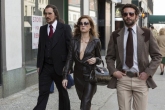 6.
American Hustle 6.
American Hustle
Director
David O. Russell's ebullient story of con artists, federal agents, mobsters,
politicians, and housewives conning each other and themselves is a big, bold,
and brash study of big, bold, and brash characters. "Some" of what happens here actually happened during a
years-long FBI sting called "Abscam," in which a confidence man helped
the feds essentially—but, according to the legal system, not
illegally—entrap a bunch of politicians into corrupt deals in order to
arrest them for corruption. The specifics of the operation aren't important, and the screenplay by
Russell and Eric Singer is far more interested in an intimate look at what makes
these characters—from Christian Bale's master of cons (and the comb-over) to
Bradley Cooper's petulant child of an FBI agent, and from a remarkable Amy
Adams' duplicitous "Lady" to a hilarious Jennifer Lawrence's
never-wrong spoiler—tick. None of these characters fits into some pre-defined mold, and there's
real tension and humor in how they always seem to improvising and juggling
multiple elements of the long grift to get a New Jersey mayor (an austerely
sincere Jeremy Renner) to take dirty money and pass it along to his friends in
Congress. This is a great piece of entertainment, blending curious fact and
enlightening fiction.
 5.
The Wind Rises 5.
The Wind Rises
For
what he says will be the final film he will direct, Hayao Miyazaki, whose
name—in some circles (It should be more)—is as synonymous with animation as
Walt Disney, has given us his most transparently personal film. The Wind Rises is the story of
an artist, the airplane designer Jiro Horikoshi, who spent the years prior to
World War II attempting to make his dream of a perfect aircraft a reality. The film, which will be released in an English-language version early
next year, exists in two worlds: a place in Jiro's mind, where he sees the
inner-workings of planes and can have one-on-one chats with his hero, and the
troubling reality of an increasingly nationalistic Japan, where the internal and
international consequences of a growing military have thrown the nation into
poverty. They blend together in a film full of staggeringly beautiful images that
translate the power of the freedom of flight and the creative process. There's something appropriate in the controversy that has arisen across
the political spectrum over the film—with people wanting it to represent
something to attack—as, ultimately, it's a lament for how forces beyond an
artist's control can determine his legacy. Miyazaki's legacy had already been firmly established, but with this
ingenious biography, it feels like he's moving into a new phase of his career
instead of bringing it to a close.
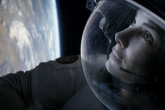 4.
Gravity 4.
Gravity
Of
all the films on this list and perhaps of all the films to come out this year, Gravity is the one I expect will be the most revisited, talked
about, and newly discovered for years—maybe even decades—to come. It's the kind of popular entertainment that transcends the
label. It's familiar in its blockbuster mold of giving us setpiece after
setpiece but on an entirely different level in how director Alfonso Cuarón
brings together a simple lost-in-space story about an astronaut encountering
Murphy's Law on steroids and groundbreaking visual effects to create an
exhilarating, sometimes terrifying experience. The screenplay by Cuarón and his son Jonás follows the misadventures of
first-time astronaut Dr. Ryan Stone (Sandra Bullock) as a hurtling mass of space
debris interrupts a mission to install new hardware on the Hubble Space
Telescope, forcing her and the mission's commander Matt Kowalski (George Clooney)
to find a different way back to Earth. After seeing so many movies where the science of space is wrong, it's
refreshing to have one that takes advantage of the purity of Newton's physical
laws and, even more importantly, the silence that space affords. The silence lets us take in the splendor of the imagery and really
appreciate the pandemonium of the film's most breathtaking sequences. Cuarón's camera is patient and free-roaming, leading to long takes of
nearly constant motion, and this really is the work of a master of the craft. It's pure and unabashedly virtuoso filmmaking.
 3.
Before Midnight 3.
Before Midnight
After
another nine-year break, we reconnect with Jesse (Ethan Hawke) and Celine (Julie
Delpy) in Before Midnight and are
delighted to find that they have not only reconnected but also formed a steady,
romantic relationship. For those of us who have followed these two characters in Before
Sunrise and Before Sunset, the
moment of that revelation is joyous, but that's about the end of the unabashed
happiness to be found in their relationship. While the previous films indulged in romantic idealism, the third entry
is, above all, more honest about them and their relationship than either of its
predecessors. The conflict of whether or not they will get together has been resolved,
and the question is if love can survive an extended period of presence. Celine is struggling with her professional life, trying to determine if
her youthful idealism is worth the trouble. Jesse is struggling with his personal life, feeling guilty about leaving
behind a family to chase his soul mate. They still talk up a storm (and the discussions, especially multi-part
conversation about love over lunch, are as invigorating as always), but there's
something formal and phony about their discussions, as if they're struggling to
come up with new stories and ideas for each other. All of this tension is building up to a heartbreaking fight at what
should be a romantic last night in Greece, and depending on one's outlook, the
ending is an affirmation of either romanticism or pragmatism.
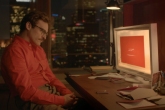 2.
Her 2.
Her
The
central conceit of Her is absurd, but
in the hands of writer/director Spike Jonze, it's far more
thought-provoking—challenging our basic concepts of what makes human beings
unique—than one might imagine the seemingly silly story of a man falling in
love with a computer could be. It's not just any computer that Theodore Twombly (Joaquin Phoenix) loves
but an operating system that is an artificial consciousness with the ability to
think for itself, adapt to its environment, and feel emotions. Upon installing the program, Theodore gives it a sex, and she gives
herself the name Samantha (voice of Scarlett Johansson). Their relationship is the film's core, and it simply doesn't work if the
two key performances can't pull off the trick. Phoenix engages in conversations with an unseen entity in a way that
makes us believe there is a real presence affecting him, and Johansson creates a
fully formed character with hopes and fears—equally confused and awed by the
very fact she exists—with only the quality of her voice.
We
also buy into this world of the near future because it seems so eerily familiar.
Everything looks and feels authentic and plausible, and the satirical
elements of a society that is wildly disconnected in human contact despite how
unified they are by technology are just a way for Jonze to start us down the
path of a series of progressively difficult philosophical quandaries. None of them are forced because Jonze's brilliant screenplay is always
examining the consequences of these ideas, and where those ideas bring the film
is haunting but hopeful.
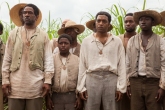 1.
12 Years a Slave 1.
12 Years a Slave
The
most remarkable accomplishment of director Steve McQueen's extraordinary film is
not the candor with which he depicts the physical violence of slavery, with long
and unflinching takes of beatings, whippings, hangings, and other forms of
sadism. Neither is it
the way he pauses for scenes in which the day-to-day lives of slaves are shown
to be a series of repetitious routines—marching to and from the fields,
laboring all day there, sleeping wherever one can in small shacks. Both of these aspects are true to the cruelty of that evil institution,
but 12 Years a Slave, the best film of
2013, acutely and precisely shows that the real brutality of slavery was
psychological. Part
of it is the juxtaposition of the cruel and the mundane, both of which work to
break its victims, but there are also scenes in John Ridley's adaptation of
Solomon Northup's autobiography that exist only to take us inside the minds of
the victims. They
begin early in the film when a nameless woman forces Solomon (Chiwetel Ejiofor,
whose devastating performance is also the year's best) to give her a moment's
pleasure before her circumstances come crashing down upon her.
Time
is a chasm in the film from which memories emerge to show Solomon's inner
torment, and three very different masters (Benedict Cumberbatch, Paul Dano, and,
the most frightening, Michael Fassbender) display the range of ways one group of
people degrade another. Even
with McQueen's adept depiction of the effects on these men, women, and children,
there are still mysteries hidden away in these characters, and the fact that the
film acknowledges it cannot understand everything about its subject just shows
how great the extent of its understanding really is.
Honorable Mention:
Captain
Phillips, The
Conjuring, Frances Ha,
The Institute, Mud, Nebraska,
Side Effects, Star
Trek Into Darkness, White
House Down, The Wolf of Wall Street, The
World's End, You're Next
Copyright © 2013 by Mark Dujsik. All
rights reserved.
 Back
to Home Back
to Home
|
Buy Related Products

|
